My last article (read the article here) introduced the six qualities of the mind that we teach at Awareness to Action International. This article is the second in a series.
“In the beginner’s mind there are many possibilities, but in the expert’s there are few.” Shunryu Suzuki
In the movie “Philadelphia,” attorney Joe Miller (played by Denzel Washington) asks a witness to “Explain it to me like I’m a four-year old.” Washington’s character was seeking clarity from the witness, but he was also demonstrating what the Zen Buddhists call “shoshin,” or beginner’s mind.
Over time, each of us gains knowledge and experience that are useful in helping us succeed in our career and our personal life. It is reasonable to want to save time by relying on what we already know rather than having to reinvent the wheel every time we are faced with a challenge. Relying on our mind’s accumulated set of “best practices” is a reasonable approach to life.
Most of the time.
The downside to the mind’s reliance on existing knowledge and prior experience is that it tends to create “expert’s mind,” the belief that we already know the answer, that our way is better, that we should continue to do things the way they have always been done.
By contrast, beginner’s mind adopts a stance of humility and openness. It is not only seeking clarity from others, it is also, like Joe Miller, putting ourselves into the attitude of a four-year-old and attempting to understand something free from our pre-existing filters and biases.
Adopting beginner’s mind does not mean that we have to be naïve and embrace someone’s perspective no matter what (even four-year-olds don’t believe everything they are told). As we will see in a future article, it is equally important to develop the discerning quality of the mind—the ability to objectively evaluate ourselves, others, and the world around us. Embracing beginner’s mind means we need to give others a fair hearing and accept that we never know where we will pick up a new, or better, idea.
Cultivating Beginner’s Mind:
To increase your ability to experience this quality, there are two lessons to keep in mind:
1. Stop trying to show how smart you are and how much value you add; start showing how smart you want to be and that you want to increase the amount of value you add.
2. Stop talking and start listening. Really listening.
Leaders often feel an obligation to demonstrate expertise and confidence; people who want to be leaders are tempted to show off their knowledge so they can advance. Both of these approaches have their value, but they can also work against us.
Displaying our knowledge may demonstrate our value to the organization, but it can send a message that we think we already know everything and are not open to learning. It can block us from taking in fresh insights and discovering better ways of doing things. When you practice intellectual humility and embrace beginner’s mind, you have an opportunity to demonstrate that you are confident enough in what you know that you are comfortable taking a learning role. It shows that you are not content with what you know and that you are someone who is eager to learn more.
The most important thing you can do to cultivate beginner’s mind is to stop talking and start listening; and after you have listened, ask questions. Get into the habit of asking people to simply “say more” so they can see that you are genuinely interested and they can feel comfortable sharing their thoughts.
In short, exercising beginner’s mind puts us into a stance of being present and open to the world around us rather than focusing on what is already inside our heads.
The irony is, you can’t be mindful if your mind is already full.






